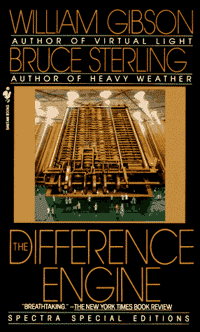Bill: At this juncture, I am prepared for typogram transmission.
Allana: Kick it.
Bill: Have you thumbed ahead and seen the size of Iteration 3? It's half the book at once!
Allana: I had no idea. Sounds like fun, though. I still feel like this iteration wasn't much to chew on, so maybe we can make this chat a bit shorter than the last one, and save up our speculation for the next typogram. I dunno, I'm not used to having so many questions, yet denying my own abilities to answer them.
Bill: Let's list questions. You start!
Allana: Are you sure the punch cards are two different sets?
Allana: Mick mentions the Napoleon in the first iteration, and in this one they are apparently of French design. Same box, same "tiny brass hooks," same milky substance. Same mauve ink.
Bill: I think there are two sets, as Mick clearly had the originals copied, but I don't think Mallory has the originals. He either has yet another copy, or somehow the copy put into the post for France by Sybil has been snatched from the postal system. Sybil does mail them. But Ada Byron seems to have the same box afterward.
Allana: Can you give me a page reference for where Mick says these have been copied? I couldn't find anything in the passage where he shows them to Sybil; is it earlier, when he's under the stage in the theatre?
Allana: Ahh. He says "the original." Gotcha. So we maybe haven't seen the originals in action yet. Although, living in the times we do, there's no reason to think that the clackers themselves wouldn't have kept copies as well.

This image of punch cards from Marcin Wichary's photostream.
Bill: You are right in noticing the description of the box: it's the same box as Mick Radley had, so the cards Edward Mallory took from Ada are the same cards we saw earlier. I guess we have still to learn how Rudwick was done in, so maybe we also have to learn how they got that box out of the post.
Allana: Yeah. Obviously Rudwick knew and mistrusted this Collins guy.
I really like your inference of "Oil!" in your comments on my section summary. I keep thinking "Science, science!" -- that these people are paleontologists first and money-grubbers second. They're still in a very dictatorial society, one where most funding comes from the government and most results of that funding gets put back in governmental hands. It's a lot different from the R&D departments of major private companies that make all the advancements today.
Your point in your summary, about the technology jumping farther forward than anyone could anticipate -- it's hard to figure how that knowledge will disseminate to smaller, more daily use if the government controls all its secrets. Information certainly can't move past international borders in this scenario. But that oil thing makes me wonder, if maybe steam technology is already on its way out, that it would have proven to be just a stepping stone to a petroleum-based society, earlier on -- and more devastating in its effects, if society is already used to machines everywhere.
Bill: Also, I think the British government is playing something like the "Great Game" in the Americas in this book. In real history, the Empire alternately supported and funded attacks on various kingdoms and powers in the Middle East, in order to keep anyone with ambition both beholden to Britain and unable to rise above a certain level. In this book they're doing that with the USA, CSA, and the Texian and Californian Republics. I think this was mentioned in the First Iteration. From page 32: "- they all take a turn in British favor, until they get to bold, and then they get taken down a peg." So those Government Exploration and Scientific Societies are likely involved in power politics on the American continent as well.
Allana: Yeah, I often mistake "power" and "money" and "knowledge" for separate goals, when they're really all just variations on the same theme. But you do have to wonder whether these early North American settlements are still very imperial in their respective societies, or if they've already taken a turn towards a more free-market system. It doesn't seem so, from what evidence we've gotten.
Bill: I don't think there's been any real detail on the politics or economy of the Americas, other than Sam Houston's desire to reinstate himself as President of Texas. I think we can assume that things are pretty much what they were in America at the point just following the Civil War, with the exception being that the Conferderacy succeeded in secceding, and is an agrarian, slave owning democracy. It's an assumption, though.




No comments:
Post a Comment